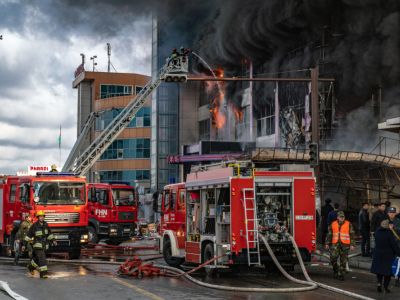In a breakthrough for the moribund Middle East peace process, Israeli Foreign Minister Shimon Peres and Palestinian President Yasser Arafat shook hands Wednesday before going into talks to hammer out a lasting ceasefire.
Smiling briefly, the two men headed into the airport building to start talks aimed at ending 12 months of bloodshed, AFP said.
The meeting took place almost a year to the day since the start of the Palestinian uprising, or Intifada, which exploded on September 28 2000 and which has claimed the lives of more than 800 people.
The talks, often delayed by Israeli Prime Minister Ariel Sharon's demand for 48 hours of absolute calm before allowing the high-level meeting, remained in doubt until the very last minute following a bomb attack that left five Israeli soldiers injured in the Gaza Strip.
One soldier was said to be in a serious condition, reported the Tel Aviv-based Haaretz newspaper.
The bomb had apparently been placed in a tunnel dug by Palestinians up to the perimeter of a military position at Tarmit, on the edge of the border town of Rafah, close to where the talks were later held.
Later five Palestinians, including two children, were injured when Israeli tanks fired on a refugee camp near Rafah, Palestinian security officials said.
Three of the injured were in a serious condition, the officials said, cited by the Palestinian news agency, WAFA.
A Sharon spokesman said the right-wing prime minister and his dovish foreign minister held last-minute talks to decide on whether the meeting should go ahead after the blast.
Under massive international pressure, in particular from his most powerful ally Washington, Sharon has softened his zero-tolerance line on violence, allowing the talks to go ahead despite scattered but non-lethal attacks in the past 48 hours.
The United States wants tensions quelled to allow it to piece together a worldwide coalition against terrorism in the wake of the September 11 attacks in Washington and New York, bringing in key Arab states.
Before the blast underneath the Gaza army post, Israeli military officials reported several mortar attacks on Jewish settlements in the strip and one mortar bomb fired from the Gaza Strip that fell in Israel itself.
Peres had pushed for Sharon to drop his insistence on total calm, arguing that it was unrealistic in a region so riven with violence.
"We are in the Middle East. It is a region with a lot of extremists and it is difficult to reach a situation where there is no incident," he told public radio early Wednesday, noting a significant drop in Palestinian attacks in recent weeks.
Sharon had accused Arafat of trying to force him to negotiate under fire, scoring political points by playing the peacemaker in front of the world while allowing attacks to continue.
Even though the Israeli government dropped its adamant demand on a total ceasefire, it said it would still get tough on Palestinian militants threatening the lives of its citizens.
"We've said very clearly that while the talks will continue, Israel reserves the right to respond when we want and with full severity to any attack," Sharon spokesman Raanan Gissin told AFP.
The Peres-Arafat meeting, to take place at the Dehaniyeh Airport in Gaza, is expected to end with a joint declaration on a ceasefire and plans for implementing the Mitchell Report, Haaretz and AFP reported.
The two men will then meet again in about a week, after both sides have begun implementing the measures stipulated in the joint declaration.
Peres told a meeting of Labor MKs on Tuesday that this second meeting "is not dependent on events."
According to Haaretz, the measures to be implemented during the first week include the following:
-The joint Israeli-Palestinian security committee will resume operation, with CIA representatives serving as supervisors and arbiters.
-Israel will remove the closure on areas where quiet is maintained and will make it easier for Palestinians to travel between Palestinian cities.
-According to Peres, the Palestinians have pledged to arrest suspected “terrorists” and start collecting illegal weapons.
The joint declaration, however, does not mention this last point; it is a very general document, formulated as a compromise between Israeli and Palestinian demands by Peres and two Palestinian negotiators, Abu Ala and Saeb Eriekat, over the weekend.
After the first week, assuming that quiet is maintained, Israel will withdraw its forces to the positions they occupied before last September's outbreak of the latest Intifada against 34 years of Israeli military occupation.
In addition, the international border crossings and the Dehaniyeh Airport will be reopened and additional Palestinians will be allowed to work in Israel, added Haaretz.
This plan, as a whole, will be considered the initial implementation of the Mitchell Report, which calls for a ceasefire, a six-week cooling-off period and then confidence-building measures, including an Israeli freeze on settlement construction.
Meanwhile, Peres told Labor Party ministers Tuesday that he had already arranged a second meeting with Arafat, which will take place next week. He said there had been a “dramatic” drop in violence in the territories and that Arafat was making a “serious” effort to reduce the violence.
"It is very difficult to reach the point of zero shooting," he told Israel Radio.
"The fact is, there is a drop [in violence]. It's not enough, it's not absolute. We have to continue working! I am one of the people who is trying to bring about a cease-fire under the very difficult conditions that exist." -Albawaba.com
© 2001 Al Bawaba (www.albawaba.com)









